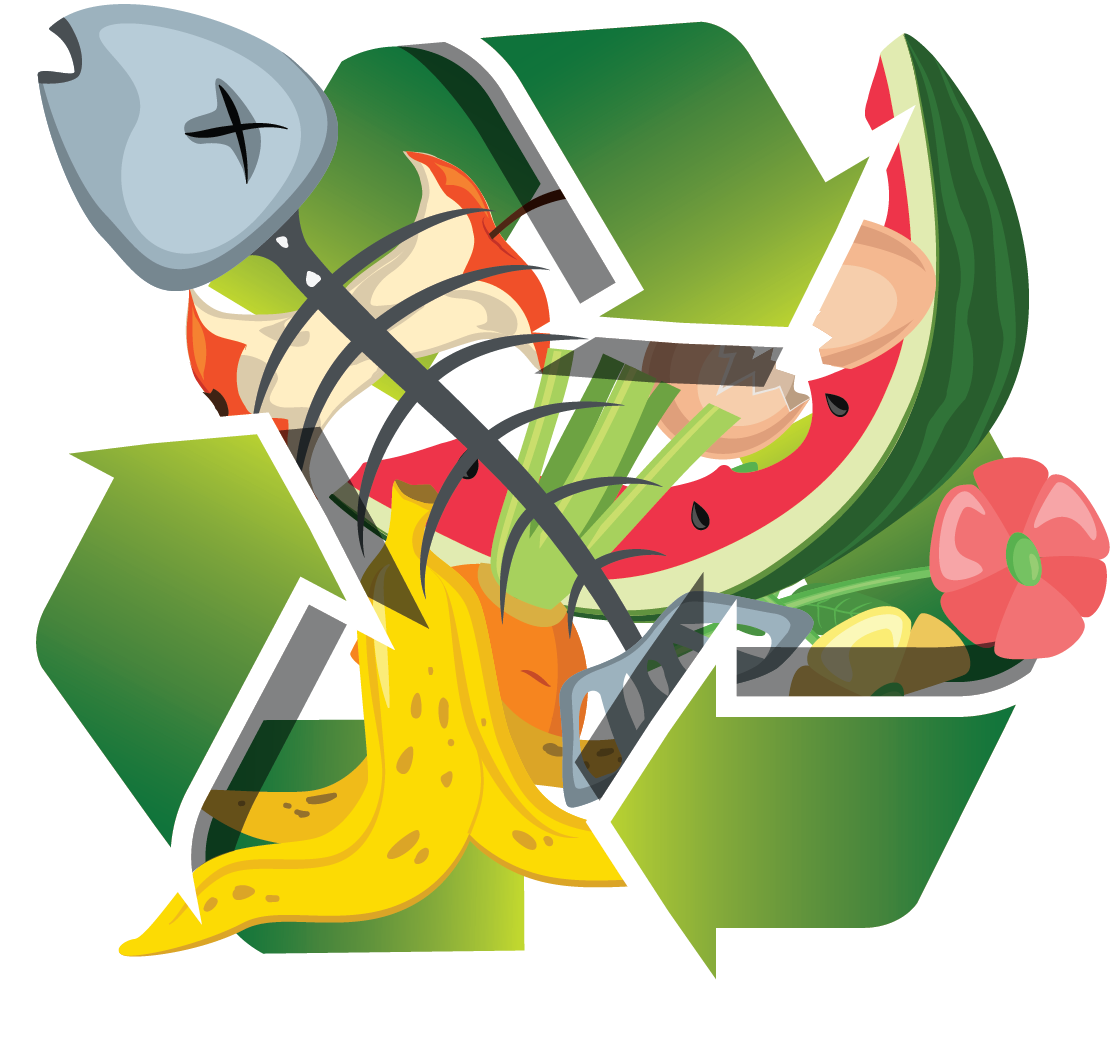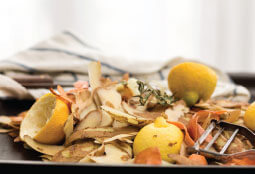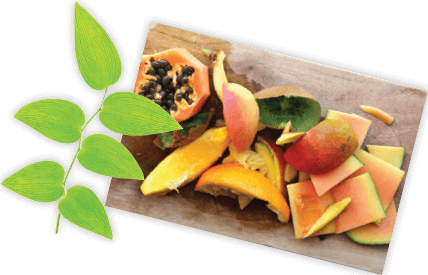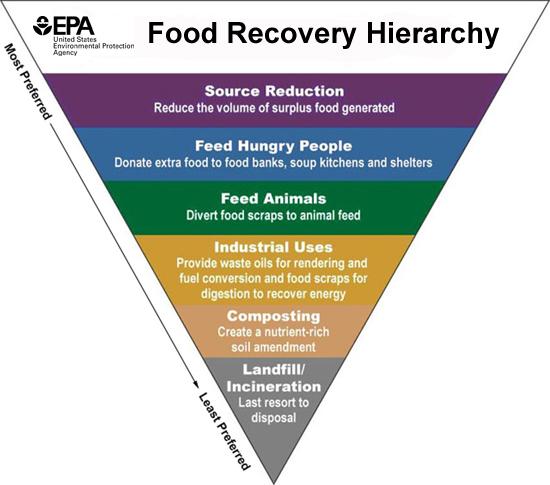Residential Services
EDCO’s Organics Recycling Program Collects Food Scraps and Landscape Waste Mixed Together in a Green Organics Container
EDCO’s Bundled Collection Service
Multi-family customers will subscribe to a bundled collection service which will include trash, recycling, and organics collection, all under one collective rate.
EDCO will provide each multi-family unit with the equivalent volume of one 32-gallon organics cart for the weekly collection of organic waste. Additional multi-family organics collection services can be provided for an additional cost in variable-size organics carts and/or dumpsters, with the volume, collection frequency, and container type based on the individual needs of the complex.
Use the green organics cart to separate materials such as landscape and pruning waste, nonhazardous wood waste, and organics, such as food waste, all mixed together.

| Recyclable Organics Includes | |
|
|
Place recyclable organics directly into your designated green collection container. Do not use any kind of plastic bags (including certified compostable or biodegradable bags) for any type of green waste, food waste, or other organics collection or disposal, as they contaminate the Anaerobic Digester! All organic material must be placed loosely inside the green container for collection. Paper bags are acceptable.
Please do not place any of the following materials in your designated green organics recycling container:
- No plastic bags.
- No trash or hazardous waste.
- No animal waste.
- No dirt, rocks, asphalt, concrete, sand, etc.
- No treated or lead-based painted wood or lumber.
Organic Waste

Organic waste is a renewable natural resource, and it mainly comes from yard and kitchen waste from homes, food waste, and industrial and commercial operations scraps. Mandatory recycling of organic waste is the next step to achieving California’s Zero Waste goals.
Recycling organics will be easy and convenient with EDCO’s commingled Organics Recycling program. EDCO has expanded its source-separated green waste collection to include recycling food waste. The service will allow customers to place food scraps in the same container as green waste. EDCO’s new Organics Recycling program will be a foundation for your community to achieve State mandates, including AB 1826, AB 1594, and SB 1383, which are directly related to organics recycling in the State of California.
EDCO’s Multi-Family Food Waste Recycling Video
To learn more about EDCO’s new Organics Recycling Program and how it will significantly impact the future of organic waste, please watch our informative video.
Why Recycle Food Waste?
Organic waste accounts for over 40% of California’s waste stream material. Organic material cannot break down when buried in a landfill, as it would in nature or a compost pile, because it decomposes without oxygen, releasing methane gas into the atmosphere.
Organic waste is recycled into valuable compost or mulch used in an organics recycling program for soil restoration. It can also be recycled by anaerobic digestion, producing nutrient-rich biofertilizers, renewable energy, and fuel. By recycling food waste, you extend valuable landfill space, which also reduces CO2 emissions and preserves our environment!

What Will Go in the Green Cart
Below are just a few examples of what will be able to be placed in your green organics cart.

Food Scraps
Fruit, vegetables, meat, bones, dairy, eggshells, prepared food

Food-Soiled Paper
Napkins, tea bags, paper plates, coffee filters

Yard Waste
Plants, leaves, branches, grass


What Can You Do Now?
In the United States alone, a shocking 40% of food is uneaten, wasted, and discarded. We, as consumers, are the largest producers of food waste, believe it or not, exceeding grocery stores and restaurants combined! So, the smallest changes add up and make a huge difference. Food Finders is a non-profit food recovery organization with the mission of eliminating hunger and food waste while improving nutrition in food-insecure communities. This supports pantries, shelters, agencies, missions, and more within a large part of the Southern California region. Food Finders coordinates all logistics of picking up and distributing your donated food, delivering same-day to a partner agency within your local area. No food is too small or too big, whether it’s perishable, nonperishable, or prepared food. To learn more, call (562) 283-1400 or visit foodfinders.org.
AB 827 – California’s Commercial Recycling and Organics Container Mandate
Effective July 1, 2020, MCR and MORe-covered businesses must provide organics and recycling containers for customers to collect waste generated from products purchased and consumed on the premises (AB 827, McCarty). These containers must be placed adjacent to the trash and be visible, easily accessible, and clearly marked.
AB 827 requirements were added to existing AB 341 and AB 1826 requirements. The new law passed in 2019, builds off existing requirements under these two laws.
- This law targets businesses that sell products meant for immediate consumption.
- Full-service restaurants do not have to provide properly labeled containers for patrons but must provide properly labeled containers next to trash containers for employees to separate recyclables and organics for customers.
AB 1826 – California’s Commercial and Multi-Family Recycling Mandate
In October 2014, California adopted Assembly Bill 1826, requiring all businesses to recycle their organic waste beginning April 1, 2016. This mandate’s phase-in helps California achieve its overall waste diversion (75% by 2020) and greenhouse gas emission reduction goals.
Requirements for Businesses: Businesses, including public entities, that generate organic waste (food or green waste) are required to arrange for organic waste recycling services. See Implementation Dates below.
Business Organic Waste Includes:
• Food, including but not limited to fruit, vegetables, cheese, meat, bones, poultry, seafood, bread, rice, and pasta; coffee filters, tea bags, cut flowers, and herbs.
• Green Waste, including but not limited to grass clippings, brush, weeds, hedge trimmings, leaves, palm fronds, ice plant, ivy, and nonhazardous wood, like branches, untreated wood, and clean wood waste.
• Compostable Paper, including but not limited to uncoated paper that is soiled with liquid or solid food waste, like napkins, paper towels, tissues, paper plates, and paper cups.
Requirements for Multi-family Properties: Multi-family properties of 5 units or more are required to arrange for organic waste recycling services.
Multi-family Organic Waste Includes:
• Green Waste, including but not limited to grass clippings, brush, weeds, hedge trimmings, leaves, palm fronds, ice plant, ivy, and nonhazardous wood, like branches, untreated wood, and clean wood waste.
Implementation Dates:
April 1, 2016, Businesses generating eight cubic yards per week of organics and multi-family properties of 5 units or more shall arrange for organics recycling service.
January 1, 2017, Businesses generating four cubic yards per week of organics shall arrange for organics recycling service.
January 1, 2019, Businesses generating four cubic yards of commercial solid waste shall arrange for organics recycling service.
Assembly Bill (AB) 1826 requires all businesses, public entities, and multifamily dwellings with five (5) units or more that generate four (4) cubic yards of commercial solid waste per week to arrange for organics recycling service. The definition of commercial solid waste was further clarified through AB 1398 and included the total amount of trash, recycling, and organics generated weekly.
EDCO can conduct free on-site visits to help businesses and multifamily properties comply with the state’s mandatory recycling requirements. Contact our Customer Service office by phone or submit a fast and easy online request by filling out the Contact Us form to arrange organic waste recycling services.
Currently, in San Diego County, there is adequate capacity for recycling landscape and clean wood; however, the infrastructure needed to meet the demand for diverting all food waste is still under development. Therefore, we will be working closely with food waste-generating customers through the following tiered approach:
• Prevention of Food Waste: First and foremost, this helps your business improve your bottom line.
• Donation of Edible Food: Nearly one in seven San Diego County residents (approximately 500,000 people annually) do not know where their next meal is coming from. Regionally, almost 500,000 tons of food waste are sent to the landfill. EDCO can assist you in setting up systems to donate food to help end hunger throughout San Diego County.
• Collection of Non-Edible Food: After all possible means of food waste prevention and donation of edible food have been pursued, the remaining food waste material will be collected for recycling.
Food Waste Prevention
Click here for information on a local Food Rescue Program and Food Bank.
In the United States alone, shockingly, 40% of food is uneaten, wasted, and thrown out. This results in an unfortunate misuse of resources needed to grow, process, and transport food while wasting money and accelerating climate change. We, as consumers, are the largest producers of food waste, believe it or not, exceeding the grocery stores and restaurants combined! So, the smallest changes we make add up and make a huge difference. Preventing food waste in the first place typically offers the most significant financial and environmental benefits. Below are some food waste prevention tips from Save The Food:
- Shop wisely: Plan your meals for the week in advance. Shop with a list. Stick to the list and avoid impulse buys.

- Proper portions: Don’t buy or serve more than you need.
- Love your leftovers: While you’re planning your meals, prepare for nights when you’re likely to go out to eat and when you might have leftovers from earlier meals. Get creative to give leftovers another life. They are the start of a casserole or soup the day after.
- Freeze it: Frozen food will keep longer. Almost anything can be frozen! But portion out, label, and date your food so that it’s easy to serve later.
- Shop your kitchen before the store: Check the fridge, freezer, and pantry for items that need to get used up before you splurge on new things.
- Don’t fall for date labels: Food doesn’t immediately spoil as soon as the date on the package has passed. Sell-by, use-by, and best-by dates are generally manufacturers’ suggestions for when an item is likely to be at its peak quality.
- Spread the word: Engage friends, family, community, and businesses in food-saving practices. Share your favorite tips with your friends and family. Encourage your local restaurants and grocery stores to avoid excessive portions and package sizes, and tell them it is ok if they run out of an item at the end of the day (so that they can avoid over-purchasing). Teach kids to value food and not to waste it.
Your Service Area
You are currently viewing services for City of El Cajon. Enter a zip code to if you want to switch to another location.